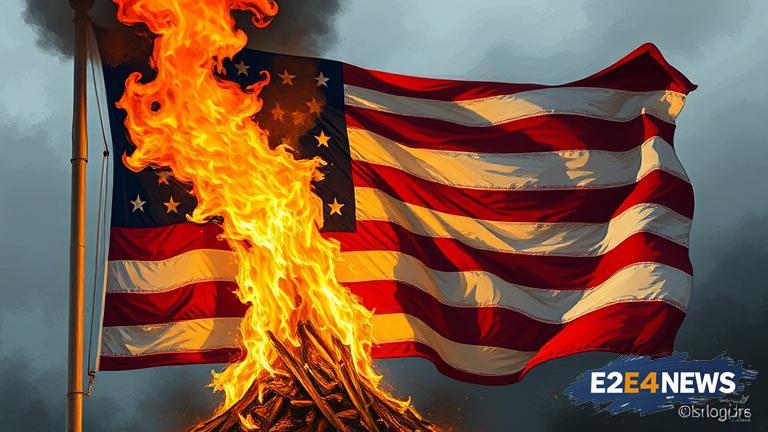President Trump has recently announced plans to introduce a ban on flag burning, a move that has sparked intense debate and controversy across the United States. The proposal has been met with fierce opposition from civil liberties groups and constitutional experts, who argue that it violates the fundamental right to free speech. The Supreme Court has previously ruled that flag burning is a form of protected speech under the First Amendment, in the landmark case of Texas v. Johnson in 1989. Despite this, Trump has vowed to push ahead with the ban, citing the need to protect the American flag and the values it represents. The move has been seen as a populist gesture, aimed at appealing to Trump’s conservative base. However, critics argue that it is a thinly veiled attempt to suppress dissent and stifle free speech. The American Civil Liberties Union (ACLU) has condemned the proposal, stating that it is unconstitutional and would have a chilling effect on free speech. The organization has vowed to challenge the ban in court, should it be introduced. The debate surrounding flag burning is complex and multifaceted, with proponents of the ban arguing that it is necessary to protect the flag and the values it represents. However, opponents argue that the flag is a symbol of freedom and that burning it is a form of protest that is protected under the Constitution. The Supreme Court has consistently ruled that flag burning is a form of protected speech, and that any attempts to ban it would be unconstitutional. In the case of United States v. Eichman in 1990, the court ruled that a federal law banning flag burning was unconstitutional, as it infringed upon the right to free speech. The court has also ruled that the government cannot prohibit the desecration of the flag, as this would be a form of censorship. The proposal to ban flag burning has sparked a wider debate about the role of the Constitution in protecting free speech. Many have argued that the Constitution is clear in its protection of free speech, and that any attempts to restrict it would be a violation of fundamental rights. Others have argued that the Constitution is not a static document, and that it must be interpreted in the context of modern society. The debate surrounding flag burning is not limited to the United States, with many countries around the world grappling with similar issues. In recent years, there have been numerous instances of flag burning and desecration, often as a form of protest or dissent. The issue has sparked intense debate and controversy, with many arguing that it is a form of hate speech or incitement to violence. However, others argue that it is a legitimate form of protest and that it is protected under the right to free speech. The proposal to ban flag burning has also sparked a debate about the role of the president in shaping the law. Many have argued that the president does not have the authority to introduce a ban on flag burning, and that any such move would be a violation of the separation of powers. Others have argued that the president has a duty to protect the flag and the values it represents, and that a ban on flag burning would be a necessary measure to achieve this. The issue is likely to be the subject of intense debate and controversy in the coming months, with many expecting it to be challenged in court. The outcome is far from certain, with many predicting that the Supreme Court will ultimately rule that the ban is unconstitutional. However, the debate surrounding flag burning is likely to continue, with many arguing that it is a necessary measure to protect the flag and the values it represents. The proposal to ban flag burning has also sparked a wider debate about the state of free speech in the United States. Many have argued that the country is experiencing a crisis of free speech, with many feeling that their rights are being eroded. Others have argued that the country is experiencing a period of unprecedented freedom, with many feeling that they are able to express themselves more freely than ever before. The debate surrounding flag burning is complex and multifaceted, with many different perspectives and opinions. However, one thing is clear: the proposal to ban flag burning has sparked a national conversation about the importance of free speech and the role of the Constitution in protecting it.
